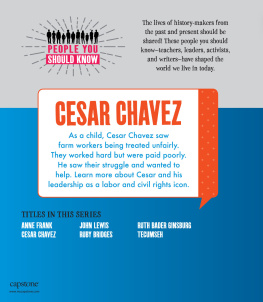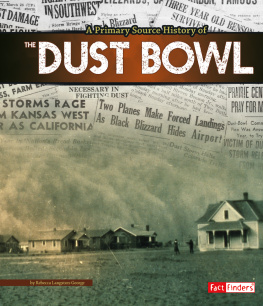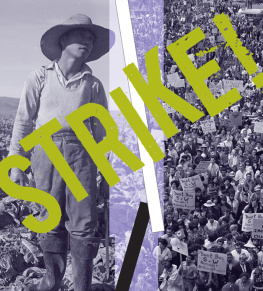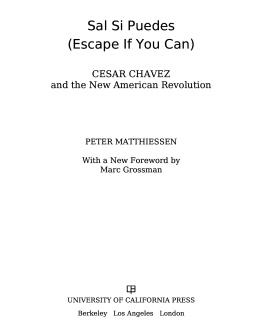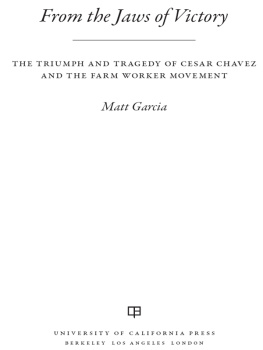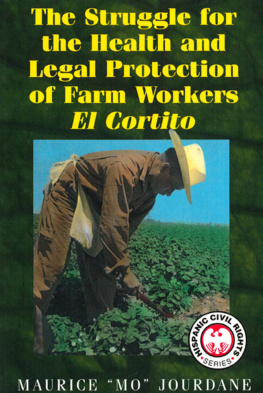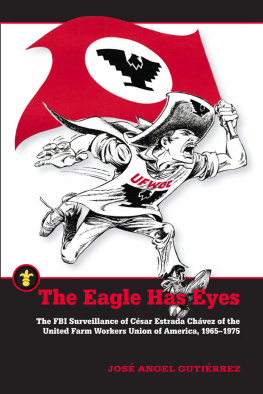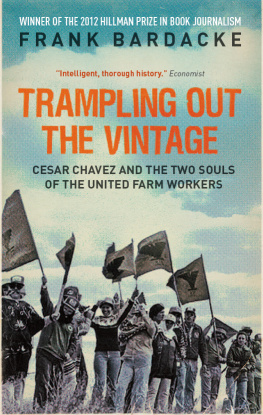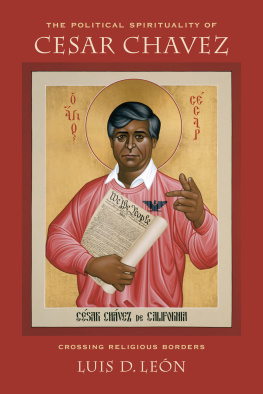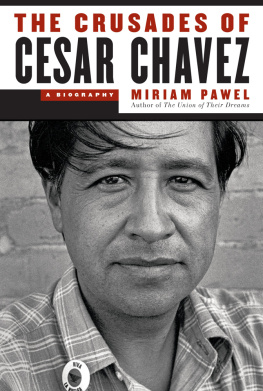1
THE NO THAT PLANTED THE SEED
On his 35th birthday, Cesar Chavez quit the best-payingand only steadyjob he had ever had.
Cesar was the national staff director of the .
Cesar was a talented organizer. He had built CSO into the most effective Latino group of its time. Even so, his idea was voted down. With that no, Cesar decided that organizing farm workers would be his mission.
Cesar and his wife, Helen (right), with six of their eight children in 1969.
2
THE GREAT DEPRESSION
Cesars grandfather Cesario left Mexico in the early 1880s. He settled in what was then the Arizona Territory, near Yuma. There, close to both the California and Mexico borders, he began to farm. Cesars parents, Librado and Juana, also farmed the land and ran a small country store. Cesario (Cesar) Estrada Chavez was born there on March 31, 1927. The family lived in the North Gila River Valley until Cesar was 11.
Young Cesar began his chores before the hot desert sun crept over the horizon. He fed the animals, chopped firewood, and gathered eggs before school. He also hunted rabbits and played on a small hill next to his house. Like many homes at the time, there was no electricity or indoor plumbing. Cesar and his younger brother, Richard, collected water from the canal for cooking, drinking, bathing, and washing clothes.
Even though the work was hard, the Chavez family loved their farm. Some two hundred aunts, uncles, and cousins lived nearby. They visited often and told stories around bonfires. Cesar and his brother swam and splashed in the canal and ate homegrown watermelon and corn.
the remains of Cesars childhood home
But life changed during the Great Depression (19291939). Librado lost the store and couldnt pay taxes on the farm. The bank sold their farm when Cesar was 11. The family moved to California hoping for a fresh start.
The Great Depressions worst years were in the early 1930s. Around 13 million people were unemployed across the United States.
Hundreds of thousands of families just like the Chavezes flooded California, desperate for work. Men called labor contractors promised good jobs with high wages and nice places to live. But in reality, most offered broken-down shacks, no bathrooms, and no rest breaks. Mexican Americans were paid less than white workers and often less than had been promised. Sometimes they even had to pay the contractor for water to drink.
The Great Depression
The Great Depression and the Dust Bowl. Years of little rain caused dust storms in Oklahoma and other Midwestern states. With no crops to sell, farmers couldnt pay back bank loans and were forced to move. Like the Chavez family, more than 300,000 people came to California seeking farm work.
The Chavez family moved from farm to farm. They lived in their car, a tent, or under bridges and trees. Cesar kept a little ball with him wherever they moved so he could play handball against the side of a building.
The entire family worked in the fields. However, Juana insisted her children go to school whenever possible. Cesar didnt like school. Teachers punished Cesar and his classmates for speaking Spanish. Because they moved so often, Cesar attended many different schools before dropping out after eighth grade.
Cesar worked in the fields full time to help his parents, often using the backbreaking short-handled hoe.
He joined the U.S. Navy in 1946 at the age of 19. Cesar never forgot the unfair treatment his family received as migrant farm workers. He thought by joining the Navy he could put it behind him. He was wrong.
The Devils Arm
Growers often demanded their laborers use a hoe with a short handle. Farm workers called the 2-foot- (61-cm-) long hoe the devils arm. Hoes with long handles worked just as well and caused less back pain. But growers thought workers did a better job stooped over using the short-handled hoe.
Working 10 to 12 hours a day while bent over was damaging to the body. Children were especially vulnerable to permanent back pain after using the devils arm.
DID YOU KNOW
Cesar met his wife, Helen, while they were both working in the fields around Delano, California. They married after he left the Navy.
In 1952 Community Service Organization organizer Fred Ross knocked on Cesars front door. Ross was organizing a chapter of the CSO, a civil rights group for Latino Americans. Their concerns were voter registration, immigration, resisting discrimination, and police brutality. Cesar wasnt interested. Finally, Cesar invited Ross into his home. He and his friends planned to pretend to listen. Then they would insult Ross until he left.
CSO members in the 1950s. Cesar is second from the right in the first row. Fred Ross is in the middle. Helen Chavez is third from the right in the back row.
But nobody was insulted that night. Ross was persuasive. Hearing him speak began Cesars career as a fighter for human rights.
Cesar worked with the CSO for a decade. As a community organizer he spoke to Latino Americans, including farm workers, around California. He listened to their problems and organized them to help themselves and receive the services they needed. He also encouraged them to become U.S. citizens, register to voteand go out and vote. In 1959 he was named CSO national staff director.
But Cesars request to organize farm workers was shot down by CSO in 1962. He decided he would start a union himself. The skills he learned at CSO would come in handy.
DID YOU KNOW
Cesar, Helen, and their eight childrenFernando, Sylvia, Linda, Elouise, Anna, Paul, Elizabeth, and Anthonywere the very first members of Cesars new union.
First, Cesar and his family went on their annual one-week paid vacationtheir last one. They pitched a tent on the beach. Cesar had saved $1,200. That money would help him travel around the state to build his union.
Though Helen and Cesar were willing to sacrifice for the cause, they had their eight children to think about. They moved to Delano, California, to be closer to their extended families. In the states agricultural heartland, Delano would offer both jobs and access to future union members.
Helen played a huge role in Cesars success. She did field work and raised their eight children so Cesar could organize. Later, she worked full time for the union.

